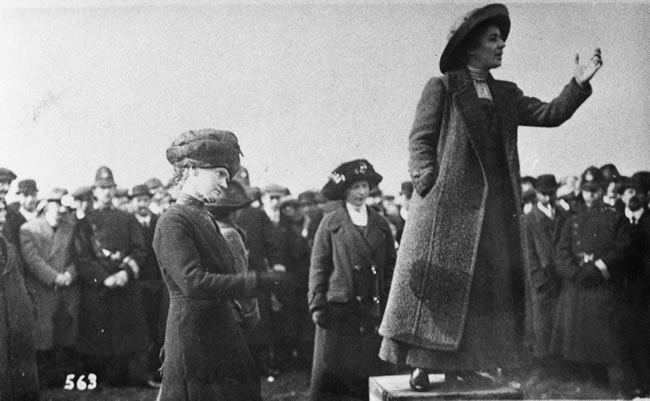Merton Remembers 2014-2018
Merton women during World War One
At the start of the First World War life for the majority of British women revolved around the home, with many others working as domestic servants. This would change dramatically as a million women took up the occupations of men serving at the Front.
Women in Merton assumed a variety of roles during the First World War, in nursing, factories, on farms and transport.
Professional nurses worked at military hospitals at The Grange, Morden Hall and the Holborn Industrial Schools between Eagle House and Bond Road, Mitcham. Volunteer Aid Detachments trained in local hospitals to work alongside medics on the battlefields, cleaning equipment, and treating the wounded. Many were women from sheltered backgrounds who learned on the job, working long hours sometimes in difficult conditions.
In Mitcham, where the Eastfields estate is now, some worked at Pain’s firework factory making military flares and others worked in the Lyxhayr factory based at the Grove Mill making military blankets and mattresses for hospitals and troop ships.
Other women became auxiliary police. There were also opportunities in the early Land Army and branches of the forces. The Women’s Auxiliary Air Force was formed in 1918 and, although not allowed to fly planes themselves, the women were given unprecedented opportunities to get involved in aero engineering.
Women also played an important part on the home front, knitting woollens for the troops and boosting morale by holding flag days to raise funds for wartime charities. Former Wimbledon suffragettes opened soup kitchens in Merton Road and Victoria Crescent, while other women worked on allotments growing crops to boost the local food supply.
Women were heavily involved in the recruitment drive, giving emotive talks at Wimbledon Theatre, encouraging men to volunteer and on occasion issuing the dreaded white feather to those they thought were evading military service.
Rose Lamartine Yates is pictured below addressing a crowd on Wimbledon Common before the war.

One Wimbledon woman, Miss Hope-Clark launched The Silver Thimble Fund which encouraged the donation of trinkets to pay for ambulances and equipment – her campaign was tremendously successful and supported the Allied war effort across the globe.
Find out more about what Merton council is doing to commemorate those who fought in the war at Merton Remembers.
At Morden Park on August 2 at 11am a Commemorative event will mark the start of the First World War and Merton's contribution during that time.
Two narrators will guide the audience through the first year of war aided by the award-winning Regent Brass band and a choir. Your attendance is requested, and - should you wish - please also bring a picnic for after the event where the brass band will play for your entertainment.
Please note that this event does not take place at Morden Hall Park, but Morden Park by the Register Office.
August 1, 2014
Related links
|
